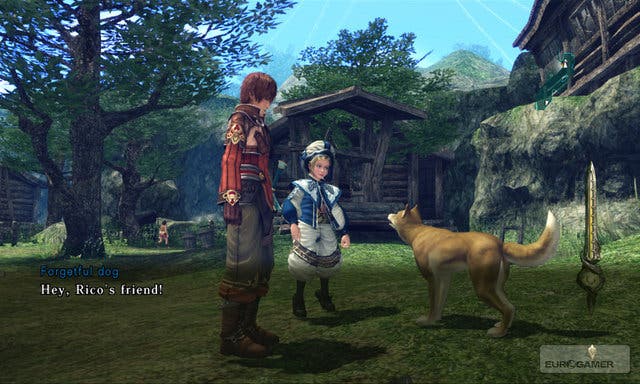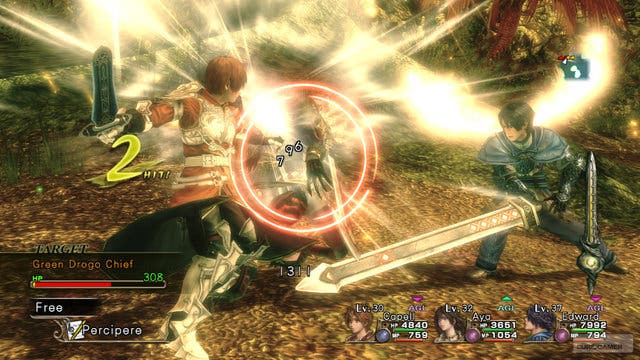Infinite Undiscovery
Better keep looking.
That title. I mean, really. Are they even trying to make sense, or do Japanese RPG developers just shove random English words together these days and hope for the best? Will next year see the release of a 60-hour epic called Melancholy Windsock Concerto? Decoding its semantic tangle, I can only surmise than an "infinite undiscovery" refers a long-winded and fruitless task that feels like it'll never end. And, funnily enough, that's almost the perfect description of this deeply flawed effort from Star Ocean creator tri-Ace.
According to the pre-release hullabaloo, the idea was to create a revolutionary game that would shake up the staid world of JRPG with its bold ideas. What we've ended up with is a game that wallows in the exact same narrative clichés as its peers, while its attempts to break out of the traditions of turn-based combat and linear progression are either non-existent or hopelessly fumbled.
Our hero is Capell. He's a pretty young flute player, banged up in prison for having the wrong face. He's the exact double of Lord Sigmund, you see, leader of a band of rebels who are roaming the land breaking chains. Chains? Yes, the bad guys have tethered the planet to the moon with giant chains in order to steal its lunar power, and Sigmund is the only man who can destroy these monstrous bonds. Or is he?
Capell is sprung from his cell by Aya, a feisty Tifa-clone and one of Sigmund's warriors who makes the same mistake as the baddies. Thinking she's freeing her brave leader, she's understandably miffed to discover she's saddled with a mewling flautist for a sidekick. As luck would have it, despite all the early cut-scenes depicting Capell as a nervous kid who fears combat, during the actual gameplay he's an instantly proficient swordsman who has no problems leading all around him into deadly battles. Such is life in a JRPG.

Make no mistake, the first hours of Infinite Undiscovery are a real chore to get through. The game offers up precious little in the way of role-playing and instead forces you through a series of disjointed and horribly executed action segments, all of which seem purposefully designed to show off the game at its absolute worst. There's a mindless chase, marred by lousy environment design that means Capell is incapable of navigating even the slightest drop without trekking all the way around it. There's a horrible stealth section that finds you creeping around a forest in pitch darkness, trying to sneak up on enemies even though the extent of your stealth abilities is walking quite slowly. There's an obscure puzzle that relies on a hitherto unmentioned and unexplained support ability, hidden in the folds of the opaque menu system. There's a bit where you have to break down a castle gate using balsa wood catapults that fly to pieces after a couple of hits.
It's just a conveyor belt of patchwork game designs, crudely stitched together. Things improve as the game progresses, and the gimmicky mini-game nonsense becomes less prevalent, but while this is an improvement of sorts it still only raises the game to the level of mediocrity. The story is cookie cutter stuff, with plot twists signposted far in advance, while the enormous cast of characters results in a game with a lot of names, but few memorable personalities. The ones that do stand out, like the horrible whimsical children Rico and Rucha, do so for all the wrong reasons.

There are eighteen characters that can be swapped around in your team. Over half of those are introduced in the first few hours and most remain under-developed and under-used throughout the game. Unless you're a fan of mindless grinding for gold there's just not enough money available to keep everyone upgraded with the best armour and weapons, which is a real problem since the game has an irritating habit of forcing you to play with specific characters for lengthy period, and for no logical reason. This frequently lumbers you with characters that are far weaker than the ones you've favoured, and thus lowers your chances of success.
As with Star Ocean, the game is entirely real-time, with no pauses while selecting items, checking the map or organising your inventory. Enemies are visible in the game-world, and combat is initiated by attacking them, or if they spot you and fancy a ruck. It's better than the random battles that often blight the genre, but since the enemies respawn almost immediately, in the exact same spot, you'll still end up grinding through too many battles just to get from A to B.


